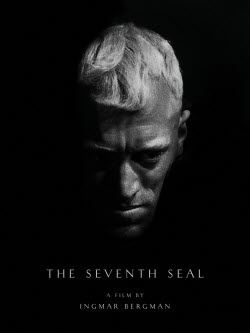|

(1957, directed by Ingmar Bergman)
- inducted 2013 -
"Just in terms of modern cultural history, the whole concept of moviemaking as a personal form of creative
expression--a means of working as an artist--would be very different if it hadn't been for Ingmar Bergman. And Ingmar Bergman's
career, reputation, and public identity would not be quite the same if he had never made The
Seventh Seal. Thanks to this movie, which I didn't actually see until I was in my late twenties, I have known for as
long as I can remember that Death is a serious-faced man with an ashen complexion who wears a hooded long robe and plays chess.
"What isn't as easy to make clear to the uninitiated is how excitingly fresh this movie still feels, after
many viewings and more than fifty years on the shelf, and how much more there is to it than its central image. Someone who
hasn't seen it might not guess how emotionally varied it is--and how funny. Bergman's ability to see reasons for despair in
anything made it possible for him, in his previous film, Smiles of a Summer Night,
to make a great sex comedy tinged with bone-shattering melancholy. Here, his seriousness of purpose and his showman's gifts
are in such uncanny balance that he doesn't undercut the power of his vision of life squandered even when he throws in an
image that might have come from one of his parodists--the man looking down from the top of the tree he's climbed to escape
danger to see Death, smiling, sawing away at its trunk.
"In his lesser work, Bergman could see cause for despair in situations that others might think better called
for a stiff drink, but in this film, with its doomed protagonist (Max Von Sydow) and set amid devastation sewn by warfare,
ignorance, and plague, he used the tools for a vision of hopelessness to forge an affirmation of the underappreciated value
of life."
Original Swedish-language title: Det sjunde inseglet
Principal cast: Gunnar Björnstrand, Bengt Ekerot, Nils Poppe, Max von Sydow, Bibi Andersson, Inga Gill, Maud Hansson,
Inga Landgré, Gunnel Lindblom, Bertil Anderberg, Anders Ek, Åke Fridell, Gunner Olsson, Erik Strandmark
Screenplay by: Ingmar Bergman, based on his play Trämålning
Produced by Allan Ekelund
Cinematography by: Gunnar Fischer
Production design by: P.A. Lundgren
Costume deisgn by: Manne Lindholm
Film editing by: Lennart Wallén
Original music by: Erik Nordgren (composer), Sixten Ehrling (conductor)
Makeup artist: Nils Nittel
Sound by: Lennart Wallin and Aaby Wedin (sound), Evald Andersson (sound effects)
Choreography by: Else Fischer
Sweden
Duration: 96 minutes
Language: Swedish, Latin
Filmed in black and white
Sound mix: mono
Cinematographic process: spherical
Aspect ratio: 1.37:1
Printed film format: 35mm
Produced by Svensk Filmindustri
Released in USA by Janus Films
Premiered in Sweden on 16 February 1957
USA release date: 13 October 1958
Awards and honors:
- The Muriel Awards, 2007: 50th Anniversary Award (winner)
- Selected as one of Roger Ebert’s “Great Movies,” 16 April 2000
- Cannes Film Festival, 1957: Jury Special Prize (winner)
- Cannes Film Festival, 1957: Palme d'Or (nominated)
|

